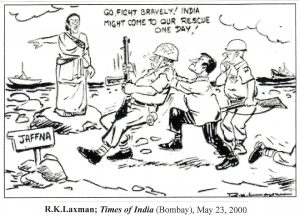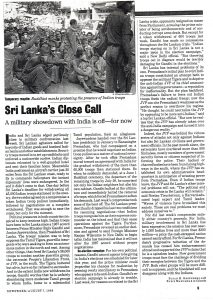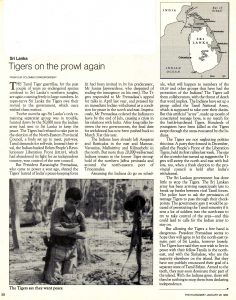When Tamil Tigers aimed for jugular at the Battle of Elephant Pass in 2000: Twentieth Year Remembrance
by Sachi Sri Kantha, May 22, 2020

R.K. Laxman cartoon in Times of India, May 23, 2000 [Pres. Chandrika Kumaratunga speaking]
“May 19th is a very important milestone in the history of Sri Lanka. 11 years ago on a day like this, on May 19th 2009, we completely defeated the separatist terrorism which had been a curse to the country for nearly 30 years.
It was President Mahinda Rajapaksa who gave the leadership for this battle in his capacity as the Commander-in-Chief. With the end of terrorism, an environment where people could live without fear or anxiety and enjoy their human rights freely was created.
After a period of 30 years, we ensured democracy and build an atmosphere where free and fair elections could be held. The atmosphere where people can travel freely without any restrictions to any place of the country was restored.
Our war heroes and their families made immense sacrifices to usher in peace to the country which was engulfed in terror. War is not a bed of roses. Especially, the war heroes had to face numerous bitter experiences and difficulties when battling one of the most ruthless terrorist organizations in the world which did not respect law. During those 30 years, helpless civilians got killed everywhere in the country. A large number of lives and properties were lost due to suicide attacks, bombing in buses, trains and buildings carried out by the terrorists.
The prime objective of the Humanitarian Mission was to bring lasting peace in the country. Because of the exceptional sacrifices made by our war heroes, today we have the opportunity to live in peace and harmony in a unitary state.
Our country, nourished by Buddhist philosophy, possesses a form of administration that an oasis for all religions and all nationalities. Throughout its history, people in this country including Sinhala, Tamil, Muslim, Malay and Burgher have had equal rights.
The motive of the extremists was to divide us. If they were successful in their attempt, our history could have taken a different course. Sri Lanka could have become a country where communities hate each other, engage in continuous battles for borders, fear of war is a common norm of life and another hapless and divided country.
The honor of liberating the country from this catastrophe should be given to all our heroic troops who fought for the peace in our country for a long time. We remember with immense gratitude, all the war heroes including General Kobbekaduwa and General Vijaya Wimalarathn

‘Sri Lanka’s close call,’ Newsweek, Aug.7, 1989
a who fought for this victory for more than 3 decades and laid their lives for the country.
As an officer who was engaged in active service for around 20 years, later as the Secretary Defence for 10 years as well as a citizen I am very well aware of the sacrifices made by our war heroes. Pain of the war is not strange to me….”
My Comments to Gota
Well, well Mr. Gota, the current Sri Lankan Commander in Chief. Here is my rebuttal to your speech. As you have become an elected politician now, you had allowed your tongue to wag a little. Certainly, you have fibbed regarding your “active service for around 20 years “in the Sri Lankan army. Let me get this straight. Technically, you were a war deserter. You had joined the army in 1971, and quit in 1990, when you got submerged in the heat of real war, and ran off to USA. You had quit the army, after reaching 40 years. It is on record that, between 1987 and 1990, you and your army buddies were idling in the barracks, when LTTE was courageously waging a war against the invading Indian army. If you had stayed put in Sri Lanka, for another 15 years or so, you might have reached ‘nirvana’ in the battle fields of Eelam, like your colleagues Kobbekaduwa and Wimalaratna in 1992. You should thank your stars. I doubt that you would have read my 2012 review of the hagiography authored by C.A. Chandraprema, about your achievements as an active soldier? If you haven’t, here is the link https://www.sangam.org/2012/07/Gota_War_Review.php?uid=4803
Gota, still you haven’t come clean on why you quit the army in 1990, when the country badly needed your services? Is it because, you were scared of your life? Now, you bad-mouth the LTTE. But the facts remain that while your then army bosses were perplexed and shaking their thighs when asked by your then Commander in Chief (Mr. Ranasinghe Premadasa) to tackle Rajiv Gandhi’s invading force, it was Prabhakaran’s army who defended the Sri Lankan pride. For your attention, I attach two news report clips of those days. (1) Sri Lanka’s close call. Newsweek, Aug.7, 1989; (2) Tigers on the prowl again, Economist, Jan. 20, 1990.
If not for Prabhakaran’s courage, Sri Lanka could have been ‘Bhutanized’. Also, may I remind you that while you negate the battle field records of LTTE as ‘terrorists’, your elder sibling Mahinda Rajapaksa had bragged about his globe-certified terrorist pal, Yasir Arafat (1929-2004).

‘Tigers on the prowl again,’ Economist, Jan. 20, 1990
Mr. Gota, do you remember, where you were in May 2000, when Tamil Tigers won the Battle of Elephant Pass. I present below, a report of that historic battle. You were not in Sri Lanka, but settled thousands of miles away from the battle scene. India’s ace cartoonist R.K. Laxman had immortalized that battle delicately with his pen. What I liked best in this cartoon, was the ‘right leg of a soldier’ run-
ning away from the Jaffna sign board. Sure, you had run away from Jaffna, not in 2000, but in 1990! In fact, you did set the trend of Sinhalese soldiers deserting their ranks.
Taming the Tiger
[Far Eastern Economic Review, May 18, 2000]
By all accounts it was an unequal contest. On one side were more than 10,000 Sri Lankan army troops defending a sprawling, heavily fortified military base in the Elephant Pass, the gateway to the Jaffna Peninsula. Ranged against them were between 1,800 and 3,500 guerrilla fighters of the Liberation Tigers of Tamil Eelam, launching yet another attack on the base after all previous attempts to take it had failed.
But this time fortune favoured the rebels. First they cut off the camp’s water supply. Then they pounded the base with heavy artillery. When the smoke cleared on April 22, the Sri Lankan army had fled, leaving an estimated 1,000 soldiers dead and Elephant Pass in the hands of the Tigers.
The rebel victory at Elephant Pass has raised the stakes in Sri Lanka’s bloody 17 year-old civil war. By capturing the only land link between the northern Jaffna peninsula and the rest of Sri Lanka, the Tigers threaten to retake their former stronghold, Jaffna town, which they lost to the government in 1995. The Tigers are fighting for a separate homeland called Eelam for the country’s minority Tamils, who see Jaffna town as their cultural capital.
‘The picture is very grim’, says Harry Goonetileke, a former head of the Sri Lankan air force. ‘I fear that the worst is yet to come.’
The possible fall of Jaffna has thrown the government of Sri Lanka into crisis. And it threatens to draw India into an active role in negotiating a political settlement to the conflict.
Seizing Jaffna would allow the Tigers to re-establish a de facto state in the region. It would further dishearten an army whose morale analysts describe as dismally low due to severe losses. Military gains by the Tigers would also weaken Colombo’s hand in peace negotiations being brokered by Norway and threaten Sri Lankan President Chandrika Kumaratunga’s party with defeat in parliamentary elections that must be held by October.
For India, the stakes are almost as high. Experts say a de facto partition of Sri Lanka could have repercussions for the disputed territory of Kashmir. ‘The government of India will not allow the partition of Sri Lanka’, says Bharat Karnad, a security expert at New Delhi’s Centre for Policy Research. ‘The question of partitioning a country has resonance in Kashmir.’ Chaos in its backyard undermines India’s claim to major power status. New Delhi is seeking to build on President Clinton’s successful visit in March by vying for a permanent seat on the United Nations Security Council and projecting itself as a naval power that can help maintain peace in Asia.
Should Jaffna fall before a deal can be reached between the Sri Lankan government and the Tigers, analysts believe India will probably push for a political solution that givers Sri Lankan Tamils considerable autonomy yet preserves Sri Lanka’s formal unity.
India’s foreign policy concerns are tempered by domestic politics. Its ruling coalition includes three Tamil parties, the largest of which, the DMK, is opposed to the Tigers but will try to ensure that India isn’t seen to side with the Sri Lankan government against the Tamils. Two other parties, the MDMK and PMK, have taken a more strident pro-Tiger stance.
New Delhi has ruled out providing military assistance to Sri Lanka – partly in deference to Tamil sensibilities. The army is also opposed to repeating India’s mistakes between 1987 and 1990, when more than 1,000 Indian soldiers died trying to implement a failed peace accord in Sri Lanka. Instead India has pledged humanitarian assistance.
With Indian air force planes on alert in southern India, the door remains open for an Indian-led evacuation of the Sri Lankan army from Jaffna, but this would likely be possible only as part of a political package aimed at resolving the conflict. On May 8, Indian foreign minister Jaswant Singh said New Delhi was willing to help with talks only if requested to by both the Sri Lankan government and the LTTE.
For now, though, all eyes are on the Jaffna Peninsula. With Elephant Pass lost, the Sri Lankan army must hold the single air base at Palaly and the small port of Kankesanthurai’ both of which allow it to get supplies in and – should the need occur – troops out.
The Sri Lankan government rejected a rebel offer of safe passage for government troops on May 8. Should Palaly be immobilized by Tiger artillery, military observers believe Kankesanthurai would fall within 24 hours. This raises the prospect of about a quarter of the Sri Lanka’s army being cut off. ‘The worst-case scenario for Sri Lanka is the fall of Jaffna with troops getting trapped,’ says Iqbal Athas, a Colombo-based defence analyst. ‘There are 35,000 to 40,000 people there, including the army, navy, air force and police.’
He says that with morale low, even 40,000 Sri Lankan troops cannot be guaranteed to ward off a Tiger force estimated at about 5,000.’ One only has to look at Elephant Pass. Over 10,000 troops gave up against a threat by about 3,500 rebels. The crucial difference is the will to fight.’
Kumaratunga has responded to the crisis by redirecting all development spending toward the war effort, extending harsh censorship laws to the foreign media and allowing the army to seize property. The government’s reasons include protecting army morale and preventing a backlash against Tamils in Sinhalese majority areas.
But Ranil Wickremesinghe, leader of the opposition United National Party, disagrees with the measures. ‘Most of the censorship and other regulations are for Kumaratunga’s domestic political agenda,’ he told the Review in an interview on May 7. At the top of that agenda is ensuring that the President’s power is not undermined by a defeat in parliamentary elections that must be held by October. Kumaratunga was first elected in 1994 on a platform of bringing peace to Sri Lanka.
Colombo’s May 4 decision to recognize Israel after 30 years without relations seems aimed at bringing in Israeli advisers and military equipment. Analysts believe that this was done with a tacit nod from India. India and Israel have had close defence ties since the two countries established diplomatic ties in 1992.
With India and Pakistan both ruling out military help, an evacuation of Sri Lanka’s forces on the peninsula is beyond the capacity of the country’s small air force and rudimentary navy. For now, Sri Lanka’s best hope is to hold off the Tigers long enough for weapons and advisers to turn the tide of battle.
*****